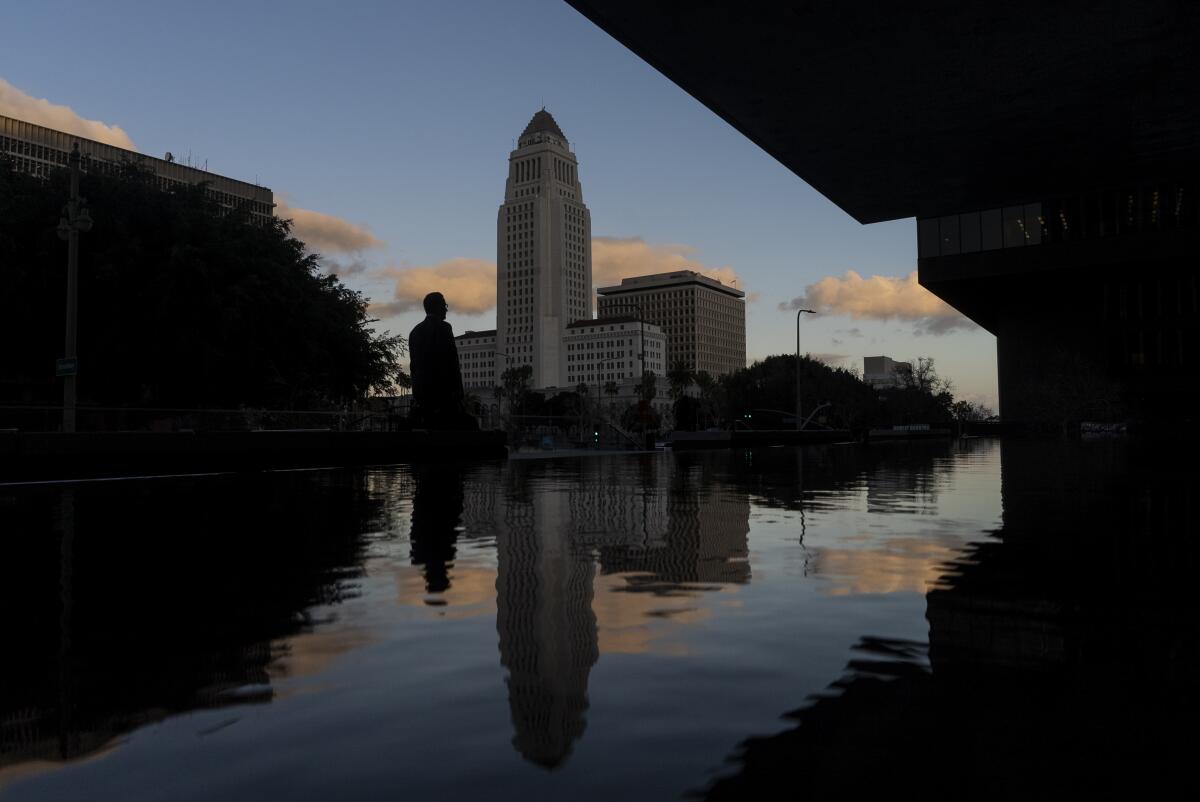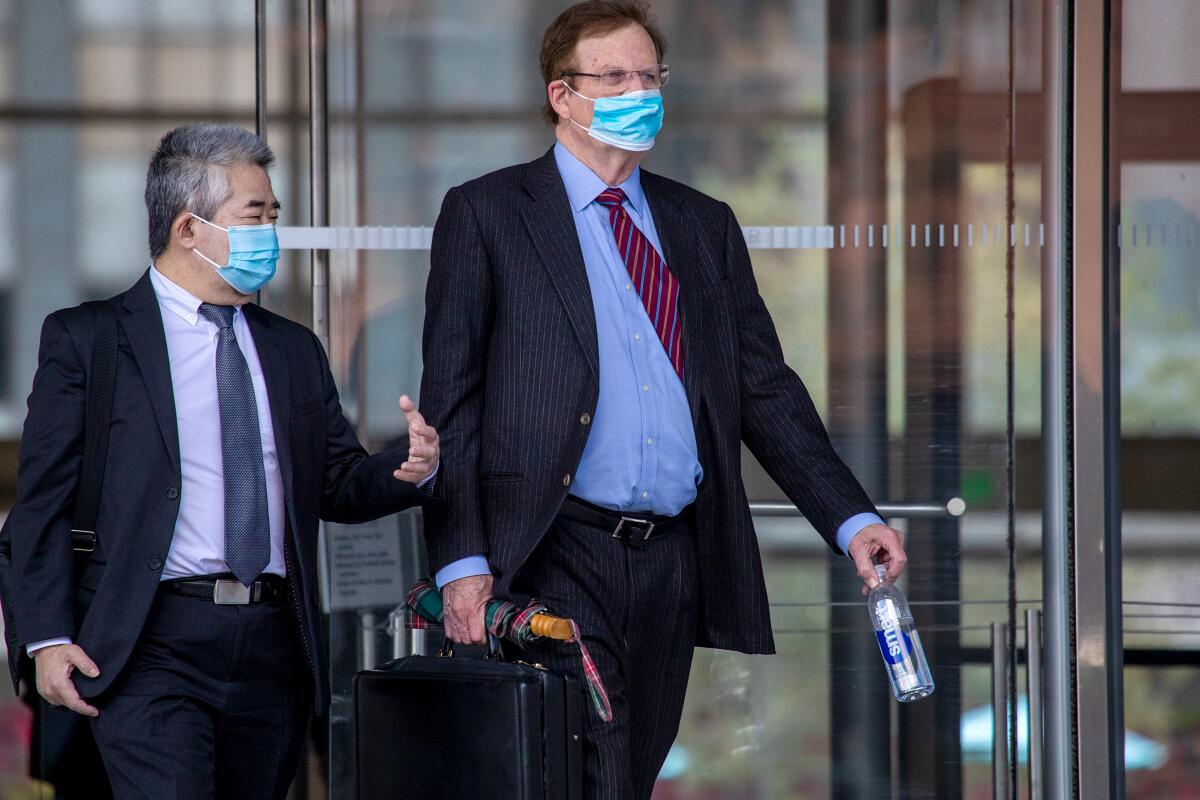L.A. on the Record: How the city budget gets made

Good morning, and welcome to L.A. on the Record — our City Hall newsletter. It’s Julia Wick, with help from David Zahniser and Dakota Smith.
Get the lowdown on L.A. politics
Sign up for our L.A. City Hall newsletter to get weekly insights, scoops and analysis.
You may occasionally receive promotional content from the Los Angeles Times.
There is a public season for the Los Angeles city budget, and a private season.
The annual State of the City address often doubles as a splashy launching pad for the public season, with the mayor previewing priorities and new programs a few days before their proposed budget is released. Per the City Charter, L.A. mayors have until April 20 to deliver their budget to the City Council.
You’re likely familiar with the roughly six-week sprint that follows: a series of public hearings in the council’s budget and finance committee; presentations from all the players and finagling over committee recommendations; then a vote in full council.
That is the sexy part, or at least as sexy as anything involving several hundred pages of fiscal policy can be. But it’s not where the actual action happens.
Deputy Controller Rick Cole, a political veteran who oversaw the budget process for two years under former Mayor Eric Garcetti, compared the phenomenon to an iceberg: The public proceedings are “the visible part of the iceberg, but the decisions got made below the waterline.”
The real cajoling, debate and decisions about how the nation’s second-largest city spends its money are made during budget development, or what we’ll call private budget season. And that’s been underway for months,
A quick refresher: L.A.’s fiscal year runs from July 1 to June 30. The mayor is responsible for formulating the budget — one of her more formidable powers — and she does so with the aid of the city administrative officer.
The task is fully in the mayor’s hands until April 20, when she hands the budget over to City Council, which has until June 1 to accept, reject or alter it. Some back and forth between both entities can follow, depending on whether changes made by the council are accepted. (For a more detailed description, see page 138 of Raphael Sonenshein’s excellent “Structure of a City Government.”)
Los Angeles mayors have historically begun their terms in July, giving them nearly a year in office before they were responsible for delivering a budget. But thanks to a change in the election cycle, Bass was plunged into below-the-waterline budget season as soon as she took office.
That’s a steep learning curve for a first-time mayor. It was widely speculated that the budget deadline helped push Bass’ decision last November to extend job offers to all Garcetti employees through April 22.
City departments submitted proposals for next year’s budget in mid-November, nearly a month before Bass assumed her role. Her office is now knee-deep in meetings with those departments, with outreach being led by Director of Policy and Budget Initiatives Joey Freeman, along with Bernyce Hollins, who started this week.
A memo that Bass sent to general managers of most city departments on Feb. 15 laid out some of her administration’s thinking.
The mayor appeared intent on tamping down expectations, saying “collective requests from departments, combined with our City’s obligations, far exceed the resources projected to be available.” Bass also said her administration will likely deny funding requests for new positions unless they’re critical, with the priority on filling the high level of vacancies.
Her memo also repeated her focus on homelessness — one of the bigger question marks for next year’s budget, since it’s not clear how much her efforts will cost.
In a revenue forecast report released this week, City Controller Kenneth Mejia noted that Bass’ “effort to fund temporary housing and spur construction of additional permanent housing is unknown, but will undoubtedly require major funding.”
The report suggested potential difficulties ahead, with general fund revenue projected to grow at a rate below that of inflation and the increase in city costs, among other issues.
Councilmember Bob Blumenfield, who chairs the city’s budget and finance committee, said Los Angeles isn’t seeing as much growth as officials would hope, nor do they have a flood of federal funds as in recent years. But it’s also not a crisis in which the city is on the verge of layoffs, he said.
“This is not a year of radical change in the sense of our budget,” Blumenfield said. “Unlike 2020, where the economy fell through the floor, and unlike some years where you’re seeing a windfall, neither of those cases is the case here.”
The budget won’t be formally handed over to Blumenfield until late April, but he and his team have begun having informal conversations about it with the administration.
The budget will be largely baked during the next month and a half, as departments lobby the mayor on myriad fronts and her office and the city administrative officer hit back with the hard questions.
Cole compared the council hearings that will ultimately follow to an elaborate show, saying that “when the dust settles, traditionally they move around less than one half of 1% of the budget.”
State of play
— SENATE BACKING: Bass endorsed Rep. Barbara Lee in the battle for Sen. Dianne Feinstein’s Senate seat, saying her experience as a “progressive fighter” in Washington is what the state needs.
— COPS ON TRANSIT: The City Council voted Wednesday to extend the LAPD’s contract to patrol Metro’s buses and trains, renewing debate over rising crime on the region’s transit system and the push to find alternatives to police.
— MORE POLICE DEBATE: The Los Angeles Police Department’s largest employee union is looking to have officers stop responding to more than two dozen types of non-emergency calls, transferring those duties to other city agencies or nonprofits while focusing on more serious crimes. The proposal is an unlikely policy agreement between the Los Angeles Police Protective League and the council’s left flank, who’ve advocated a similar shift.
— CD 6 UPDATE: Candidates Marisa Alcaraz, Imelda Padilla and Marco Santana are raising the most money in the City Council District 6 race. Through Feb. 18, Alcaraz raised $100,606, Padilla raised $55,362, and Santana brought in $53,900. Mail-in ballots will be sent to voters starting next week in the April 4 special election to fill the vacancy left by former Council President Nury Martinez.
— ANIMAL SERVICES FALLOUT: It’s been more than a year since the troubled Department of Animal Services had a permanent general manager. Bass spokesperson Zach Seidl told The Times that a nationwide search, which started under Garcetti, remains underway for the post. Animal advocates will rally Saturday at the West Los Angeles shelter to protest conditions for the animals and demand that Bass appoint a general manager.
— MORE TAX TIME: Following the IRS’ lead, Gov. Gavin Newsom announced Thursday that most Californians won’t have to pay their state taxes until Oct. 16. The delay is available to residents in Los Angeles and 50 other counties covered by a federal emergency declaration.
— BASS BACKS BUYBACK: Bass heads to a gun buyback event in Wilmington today (Saturday), an interesting move given the council’s recent split vote on the program. Earlier this week, Councilmembers Hugo Soto-Martínez and Eunisses Hernandez voted against a plan to use county funds to pay for the event, which lets residents to turn in weapons they no longer want in their homes. Soto-Martinez voiced concern that the LAPD would be involved — and receive overtime pay.

Chan trial halted (for now)
The federal government’s corruption trial against former Deputy Mayor Raymond Chan was abruptly halted Friday after his main lawyer fell ill and went to the hospital.
Chan, a onetime aide to Garcetti, is accused of playing a major role in the sprawling shakedown scheme run by former Councilmember Jose Huizar, who pleaded guilty last month.
Brendan Pratt, part of Chan’s defense team, told the courtroom that Harland Braun, 80, had “some type of infection” affecting his organs and would likely be out of commission for several days. Chan, who faces bribery and other charges, did not want to proceed without Braun.
The disruption comes with the trial well under way. Jurors have heard from several prosecution witnesses, including former planning commissioner David Ambroz, mayoral aide Kevin Keller and Richelle Rios, estranged wife of Huizar.
While Braun is a courtroom veteran, Pratt received his law degree in 2021. At one point, U.S. District Judge John F. Walter asked Pratt if he was familiar with an upcoming filing dealing with exhibits in the case.
Pratt said he is mainly serving Chan’s team in an “administrative support role” — making clear that Braun is doing the legal heavy lifting. The judge told Pratt that, as an attorney of record in the case, he would need to step up and familiarize himself with the exhibits.
With so much uncertainty surrounding Braun, Assistant U.S. Atty. Mack Jenkins asked the judge to provide the worst-case scenario for the case moving forward.
“I’m going to do everything in my power to keep this trial on track,” the judge said. “I’m definitely not going to mistrial.”
Walter didn’t sound completely assured about what comes next.
“We will be in recess until .. until who knows?” he said before leaving the chamber.
Enjoying this newsletter? Consider subscribing to the Los Angeles Times
Your support helps us deliver the news that matters most. Become a subscriber.
QUICK HITS
- Where is Inside Safe? Mayor Karen Bass’ signature homelessness initiative went to Hoover and 115th streets in South L.A this week. Fifty-four people in the neighborhood, located west of Watts, were moved indoors, according to the mayor’s office.
- On the docket: Bass will serve as honorary falconer at Saturday’s LAFC soccer game.
Stay in touch
That’s it for this week! Send your questions, comments and gossip to [email protected]. Did a friend forward you this email? Sign up here to get it in your inbox every Saturday morning.
Sign up for Essential California
The most important California stories and recommendations in your inbox every morning.
You may occasionally receive promotional content from the Los Angeles Times.





